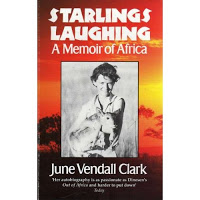
I bet there aren’t too many blogging on this one.
I’ve had this in my bookcase for a while; it belonged to a friend of my father’s, who was forced to leave Zimbabwe during the Gukurahundi (if you don’t know what this is you really ought to Google it), lived in Darfur for a while, setting up schools (most of which were burnt down in the recent events there – definitely Google that if you don’t know what that’s about) and then had to move to London as he badly needed the NHS, due to an incident with a stomach virus and some vets. He spent the rest of his life in a tiny flat, a fine example of living in a way above and beyond your circumstances: books, newspapers, music, his flat was as big as the world mentally, for sure.
ANYWAY. I still didn’t really want to read this soppy “Memoir of Africa,” (that’s it’s very dodgy subtitle). I just had it because it had his name in it in his rather charming old school hand. Anyway, I was too hungry to lug my ass to the Library, so I needed someething to read and had a look through the bookcase. I thought it would probably be kind of racist, and full of weird issues about being ‘British’ in this exotic land, even though she’s lived in Africa since she was four, so how it’s exotic I’m not clear. So I thought that was how it would be and I wouldn’t like it, but what do you know, that is how it is and I kind of like it!
Actually, it’s not very racist; it’s problematic by our standards, but it’s very clear from her description of her life that she was far more liberal than anyone she knew. She was in Bulawayo from the age of four, and we learn all about her WWI veteran father, and her parents’ horribly bad marriage, and her weird childhood; she wasn’t allowed to play with white children in case she lost her upper class accent. She got pregnant at 16 by the first man she kissed. This being the 1940s, she had to marry him and went on to have 25 years of misery. They founded a farm in Matopos, and have moved to camp in the middle of the Okavango Delta – that’s where I am now.
The book is firstly interesting, and quite charming, for her clear love of the African landscape, and, in a strange and mixed up way, her love of African people. It’s full of vervet monkeys getting into the chicken coop and throwing eggs at each other and at the chickens, of chats that fly into her bedroom in the morning and wait to have some of her toast, of sunset over the granite hills and so on. She spoke fluent Ndebele, and knew a great deal of the culture and wife of life of these people – she even knew a man who’d fought in Lobengula’s impi (Google also).
It’s also interesting as a view into her community and the ideals of her time. She’s totally not bothered to tell us she never got on with her mother: no remorse, no bitterness, and even better, no psychologising. Very not modern. I love it. Apparently once her mother was moaning about something, and our author told her not to, and the mother replied, with pride “But I’ve always been a grouser. I’ve always been a moaner.” This is too much for our author.
It’s more or less a biography, but fabulously also she spends little time on her children. Love it. You certainly get the impression that the farm and the landscape were of far more interest to her than her children, and, incredibly interstingly, she feels no societal pressure to pretend it isn’t so. She gets pregnant for the third time, and is with good reason too scared to get a backstreet abortion, so goes through with it, and refers to it quite frankly as a little wretch.
Also, there’s lot of sex and naked dinner parties, which goes very oddly with the fact that she felt she couldn’t get a divorce. I’m not quite following. More when it’s finished.
